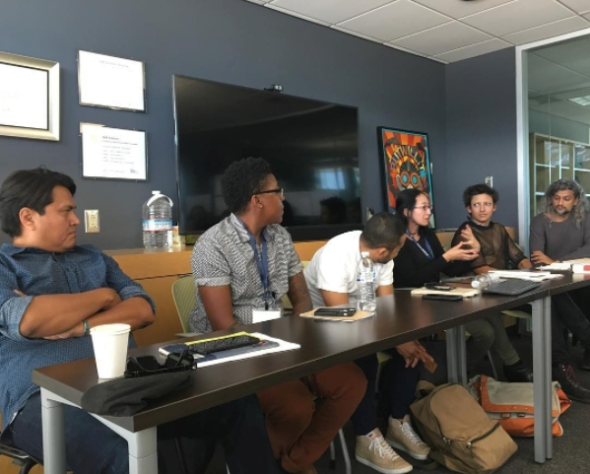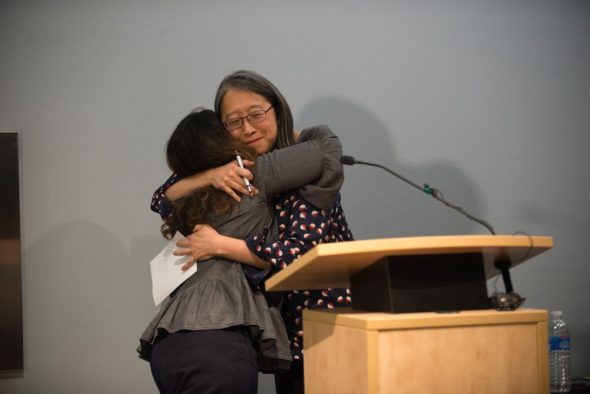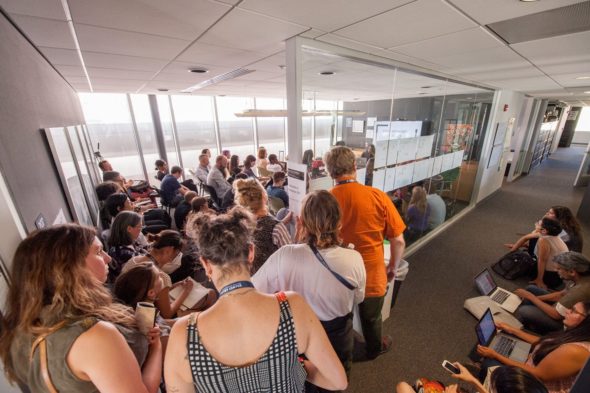Thinking Its Presence 2017 (TIP), a conference focused on explorations of race, creative writing, and art, was held earlier this month at the UA Poetry Center. 2017 marked the third year for TIP and the theme was ‘The Ephemeral Archive,’ inspired by the critical theories of José Esteban Muñoz. As a Submittable team member working remotely from Tucson, it was my luck and honor to participate as a volunteer and attendee.
The conference included over 70 events in a variety of media spanning three packed days and nights (plus offerings by Tucson organizations Kore Press, POG,and Casa Libre before and after the conference). There were 17 volunteers who contributed to the event, as well as the ten TIP board members (including the event founder and Board President Prageeta Sharma), the UA Poetry Center staff, and over 250 presenters.
 Simply put, there’s no simple or direct way to write about the experience—its richness, depth, and scope far exceed blog language and blog length (any language, many lengths). That said, I’m excited to share an interview with friend and fellow volunteer Aya Satoh, because her words speak so well to the complexity, singularity, necessity, and gravity of this gathering.
Simply put, there’s no simple or direct way to write about the experience—its richness, depth, and scope far exceed blog language and blog length (any language, many lengths). That said, I’m excited to share an interview with friend and fellow volunteer Aya Satoh, because her words speak so well to the complexity, singularity, necessity, and gravity of this gathering.
Volunteers were a key part of Thinking its Presence: they assisted with moderation, registration, technology, directions, ensuring hydration via water bottles (it was over 90 degrees). Aya was one of three passionate supporters of #TIP2017 (with Jordan Chestnut and Aja Mujinga Sherrard) who traveled from Missoula, MT, to assist and attend. A second-year poet in the MFA program at University of Montana, Aya was born in Japan and raised in Massachusetts. Here’s what she said:
What led you to volunteer for Thinking Its Presence 2017?
I’m lucky enough to be studying with Prageeta Sharma at UM, otherwise I probably never would have heard about TIP. As I’ve become more invested in my writing life, I’ve come to realize how important community is. I have a wonderful and supportive MFA community here at UM, but there are very few POCs in the program, and it’s become very clear how crucial it is to have a writing space where you aren’t tokenized. TIP was the first creative space/community I’ve ever experienced that allowed me to let down that wall and be vulnerable and part of the “we.”
What were the highlights from each volunteer role you held (moderation, registration)?

Readings and Presences. Photo by Aya Satoh.
The registration table was a great way to see all of the incredible poets, artists and academics that came to the conference. (I definitely had my starstruck fan girl moments while I was working the registration table.) At the table, we also had a finger on the pulse of the conference at any given time, which was exciting.
Moderating the Readings and Presences was such an honor. It was so humbling and inspiring to be in the company of such incredible, innovative, brave, and thoughtful poets. I loved seeing how each poet’s work spoke to others’, the threads of communication and kinship.
What were the most inspiring aspects of the conference experience as a whole?
There was an incredible level of care and thoughtfulness throughout the entire conference, which I really believe came from a collective unburdening. I had never been to a reading before of all Asian/Asian-American poets and that was a moment that I will never forget. To feel so part of something, even just as a listener, was life-changing.
As a writer who is still just beginning, it was meaningful that there was no pretension or feelings of hierarchy coming from the more established and well-known writers. I had conversations with writers who I really admire that spoke to me as a person, rather than a fan or fledgling.

It was also incredibly moving to be in such a committed, passionate, and curious group of POC writers, whose academic work wasn’t afraid to move into the personal and wasn’t afraid to be emotional. It was a poignant reminder of how as a POC, the political is always personal and that not shying away from that, especially in academic arenas, is a valid way to approach theory and criticism.
I could keep going–Douglas Kearney! Brandon Som! Duriel Harris! Chen Chen! Ching-in Chen! Ruth Ellen Kocher! Sherwin Bitsui! Kazim Ali! Orlando White!
What was most challenging?
It was a packed conference in terms of time and emotional work. I feel like I need a week or even month alone to process everything that I heard and saw and experienced.
How did the conference impact or expand your sense of literary community?
I’m a broken record, but it gave me a sense of home and being seen that I didn’t even know how much I needed. It was also really invigorating to see the breadth and depth of what the POC writing community is interrogating. From surveillance, the body as a historical archive, movement, genre-bending works, how to bring the academic and creative into the larger community.
***
Please note, this is only one entry into the event. Entropy will be sharing essays on Thinking Its Presence 2017, and you can expect recordings and other materials from the UA Poetry Center in the future – if you’ve written on the event as well, be in touch. We’d love to link to your work.
Thanks Aya for her time and insights, to everyone involved in #TIP2017 for the magnitude of this event, and to Submittable for providing the registration form (for volunteers and attendees) and sponsoring the conference’s first two years–also for letting me attend and engage with the event on our blog.
If you write about engaging with literary community, or any other facet of the writer’s life, there’s space for you too. The blog editors would be delighted to read your work.
Thinking about writing and inclusivity? You might also be interested in VIDA (and Submittable).
**All photographs by A.T. Willett, courtesy of the UA Poetry Center, unless otherwise noted.